Related Research Articles

Arthur Robert Jensen was an American psychologist and writer. He was a professor of educational psychology at the University of California, Berkeley. Jensen was known for his work in psychometrics and differential psychology, the study of how and why individuals differ behaviorally from one another.
John Philippe Rushton was a Canadian psychologist and author. He taught at the University of Western Ontario until the early 1990s, and became known to the general public during the 1980s and 1990s for research on race and intelligence, race and crime, and other purported racial correlations.
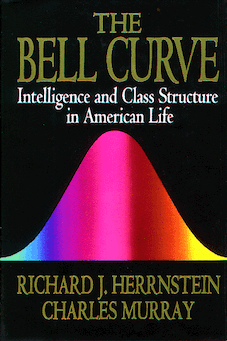
The Bell Curve: Intelligence and Class Structure in American Life is a 1994 book by psychologist Richard J. Herrnstein and political scientist Charles Murray, in which the authors argue that human intelligence is substantially influenced by both inherited and environmental factors and that it is a better predictor of many personal outcomes, including financial income, job performance, birth out of wedlock, and involvement in crime than are an individual's parental socioeconomic status. They also argue that those with high intelligence, the "cognitive elite", are becoming separated from those of average and below-average intelligence, and that this separation is a source of social division within the United States.
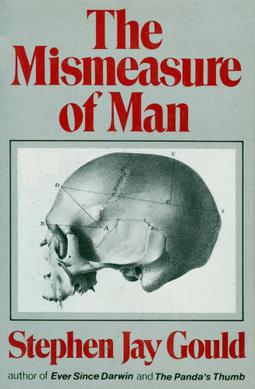
The Mismeasure of Man is a 1981 book by paleontologist Stephen Jay Gould. The book is both a history and critique of the statistical methods and cultural motivations underlying biological determinism, the belief that "the social and economic differences between human groups—primarily races, classes, and sexes—arise from inherited, inborn distinctions and that society, in this sense, is an accurate reflection of biology".
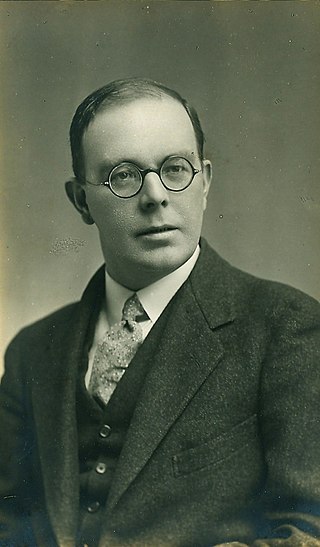
Sir Cyril Lodowic Burt, FBA was an English educational psychologist and geneticist who also made contributions to statistics. He is known for his studies on the heritability of IQ.
Scientific racism, sometimes termed biological racism, is the pseudoscientific belief that the human species can be subdivided into biologically distinct taxa called "races", and that empirical evidence exists to support or justify racism, racial inferiority, or racial superiority. Before the mid-20th century, scientific racism was accepted throughout the scientific community, but it is no longer considered scientific. The division of humankind into biologically separate groups, along with the assignment of particular physical and mental characteristics to these groups through constructing and applying corresponding explanatory models, is referred to as racialism, race realism, or race science by those who support these ideas. Modern scientific consensus rejects this view as being irreconcilable with modern genetic research.

Richard Lynn was a controversial English psychologist and self-described "scientific racist" who advocated for a genetic relationship between race and intelligence. He was a professor emeritus of psychology at Ulster University, but had the title withdrawn by the university in 2018. He was the editor-in-chief of Mankind Quarterly, which is commonly described as a white supremacist journal. Lynn was lecturer in psychology at the University of Exeter and professor of psychology at the Economic and Social Research Institute, Dublin, and at the University of Ulster at Coleraine.
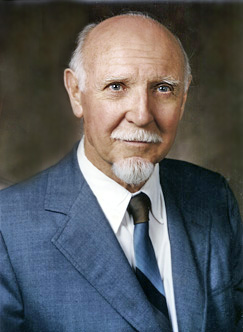
Raymond Bernard Cattell was a British-American psychologist, known for his psychometric research into intrapersonal psychological structure. His work also explored the basic dimensions of personality and temperament, the range of cognitive abilities, the dynamic dimensions of motivation and emotion, the clinical dimensions of abnormal personality, patterns of group syntality and social behavior, applications of personality research to psychotherapy and learning theory, predictors of creativity and achievement, and many multivariate research methods including the refinement of factor analytic methods for exploring and measuring these domains. Cattell authored, co-authored, or edited almost 60 scholarly books, more than 500 research articles, and over 30 standardized psychometric tests, questionnaires, and rating scales. According to a widely cited ranking, Cattell was the 16th most eminent, 7th most cited in the scientific journal literature, and among the most productive psychologists of the 20th century. He was a controversial figure due in part to his friendships with, and intellectual respect for, white supremacists and neo-Nazis.

William McDougall FRS was an early 20th century psychologist who spent the first part of his career in the United Kingdom and the latter part in the United States. He wrote a number of influential textbooks, and was important in the development of the theory of instinct and of social psychology in the English-speaking world.

Mankind Quarterly is a journal that has been described as a "cornerstone of the scientific racism establishment", a "white supremacist journal", and "a pseudo-scholarly outlet for promoting racial inequality". It covers physical and cultural anthropology, including human evolution, intelligence, ethnography, linguistics, mythology, archaeology, and biology. It is published by the Ulster Institute for Social Research, which was presided over by Richard Lynn until his death in 2023.
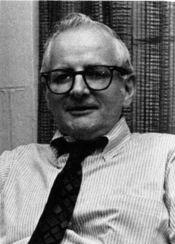
Leon J. Kamin was an American psychologist known for his contributions to learning theory and his critique of estimates of the heritability of IQ. He studied under Richard Solomon at Harvard and contributed several important ideas about conditioning, including the "blocking effect".

Linda Susanne Gottfredson is an American psychologist and writer. She is professor emeritus of educational psychology at the University of Delaware and co-director of the Delaware-Johns Hopkins Project for the Study of Intelligence and Society. She is best known for writing the 1994 letter "Mainstream Science on Intelligence", which was published in the Wall Street Journal in defense of Richard Herrnstein and Charles Murray's controversial book The Bell Curve (1994).
Glayde D. Whitney was an American behavioral geneticist and psychologist. He was professor at Florida State University. Beyond his work into the genetics of sensory system function in mice, in his later life he supported David Duke as well as research into race and intelligence and eugenics.
Robert Travis Osborne was an American psychologist. He was professor emeritus of psychology at University of Georgia, and director of the Pioneer Fund, an organization prominently described as white supremacist in nature, from 2000 until his death.

Race, Evolution, and Behavior: A Life History Perspective is a book by Canadian psychologist and author J. Philippe Rushton. Rushton was a professor of psychology at the University of Western Ontario for many years, and the head of the controversial Pioneer Fund. The first unabridged edition of the book came out in 1995, and the third, latest unabridged edition came out in 2000; abridged versions were also distributed.

"Mainstream Science on Intelligence" was a public statement issued by a group of researchers led by psychologist Linda Gottfredson. It was published originally in The Wall Street Journal on December 13, 1994, as a response to criticism of the book The Bell Curve by Richard Herrnstein and Charles Murray, which appeared earlier the same year. The statement defended Herrnstein and Murray's controversial claims about race and intelligence, including the claim that average intelligence quotient (IQ) differences between racial and ethnic groups may be at least partly genetic in origin. This view is now considered discredited by mainstream science.
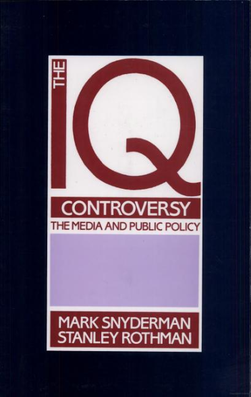
The IQ Controversy, the Media and Public Policy is a book published by Smith College professor emeritus Stanley Rothman and Harvard researcher Mark Snyderman in 1988. Claiming to document liberal bias in media coverage of scientific findings regarding intelligence quotient (IQ), the book builds on a survey of the opinions of hundreds of North American psychologists, sociologists and educationalists conducted by the authors in 1984. The book also includes an analysis of the reporting on intelligence testing by the press and television in the US for the period 1969–1983, as well as an opinion poll of 207 journalists and 86 science editors about IQ testing.
The history of the race and intelligence controversy concerns the historical development of a debate about possible explanations of group differences encountered in the study of race and intelligence. Since the beginning of IQ testing around the time of World War I, there have been observed differences between the average scores of different population groups, and there have been debates over whether this is mainly due to environmental and cultural factors, or mainly due to some as yet undiscovered genetic factor, or whether such a dichotomy between environmental and genetic factors is the appropriate framing of the debate. Today, the scientific consensus is that genetics does not explain differences in IQ test performance between racial groups.
The following outline is provided as an overview of and topical guide to human intelligence:
Aurelio José Figueredo is an American evolutionary psychologist. He is a professor of psychology, Family Studies and Human Development at the University of Arizona, where he is also the director of the Ethology and Evolutionary Psychology Laboratory. He is also a member of the interdisciplinary Center for Insect Science at the University of Arizona. His major areas of research interest are the evolutionary psychology and behavioral development of life history strategy, cognition, sex, and violence in human and nonhuman animals, and the quantitative ethology and social development of insects, birds, and primates. He is known for his research on personality, such as a 1997 study in which he and James E. King developed the Chimpanzee Personality Questionnaire to measure the Big Five personality traits in chimpanzees.
References
- 1 2 3 Incollingo, Beth Fand (October 5, 2009). "Retiring Rutgers–Camden Psychology Professor Stays True to Egalitarian Social Values Shaped by the '60s". Rutgers Today. Retrieved January 23, 2020.
- ↑ Winston, Andrew S. (January 2023). "William H. Tucker (1940–2022)". American Psychologist. 78 (1): 65–65. doi:10.1037/amp0001071.
- ↑ "Psychologist to discuss the science of race research". Bates College. 1996-03-27. Retrieved 2018-01-12.
- ↑ ISAR Advisor Council, Retrieved February 7, 2006